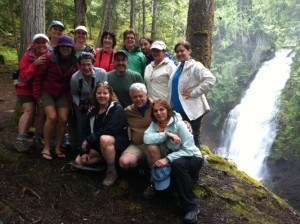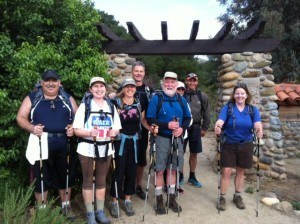Q&A with client Markeeta Brown

The Mountain Trek crew from this past May. Markeeta is front and centre in the black jacket
Welcome to the fourth installment of our Q&A series, which features guests who have visited Mountain Trek. Each person came to our fitness retreat and health spa for their own reasons and they all had different experiences. In this piece we speak with Markeeta Brown, a resident of Dallas, Texas, who works in real estate. She’s visited Mountain Trek’s BC lodge every year since 2010 as well as joined us for our programs at Rancho La Puerta in California. Markeeta says she’s been making the journey to Mountain Trek the past three years because it’s helped her work around a number of life changes she’s been going through recently. Here is Markeeta’s story.
Hi Markeeta. Thank you so much for speaking with us today. Firstly, how did you find out about Mountain Trek?
I’ve been going to Rancho La Puerta (RLP) off and on for about 30 years. It was kind of my summer camp but after I made the decision to separate from my husband I knew I had to go to the ranch and do some extended hiking. I went for two weeks in November 2010 and did the Mountain Trek program. I loved its structure and since then I’ve returned three times to the BC lodge and three times to Rancho.
Tell us about your expectations?
BC is a different type of hiking than the milder terrain at RLP but Mountain Trek’s overall program at both places is the same. I know I’ll always go home with much more energy and focus. The thing that keeps drawing me back is it’s a challenge but it’s not overwhelming or stressful. The after-effects are much more lasting that anything I can do on my own. I also like that (head guide) Kirkland emphasizes to try and take on only two new habits when we return home to keep things manageable, rather than try and alter everything about our lives. It’s a challenge but it’s doable.
What are some of the highlights of your time at Mountain Trek?
Anybody who attends Mountain Trek will take home about 18 things you can do to supercharge your energy. But the program emphasizes that you only concentrate on two things and overlay those good habits over your bad ones. For me it was about only eating three meals and two snacks max a day and doing cardio a minimum of four times a week.

The Mountain Trek program at Rancho La Puerta last November. Markeeta is on the far right.
What’s a lowlight from your experiences at Mountain Trek?
They seem to be putting a lot more emphasis on using foam rollers in the stretch class and that’s challenging for me. (laughs) But between the yoga and stretching in the morning and the massages in the evening I don’t experience a lot of physical discomfort.
What’s it like every time you return home after visiting Mountain Trek?
People notice. They say, “Wow you look great and you must feel great.” And I do. I think it’s important though to clear the deck a week or two after you return. You need to come home with a plan and have a bit of time when your life isn’t totally crazy so you can incorporate some of the things you’ve learned.
So what draws you back to Mountain Trek every year?
Lately I’ve had one major life challenge after another and Mountain Trek allows me to focus – it gives me a better chance to continue with my momentum. Plus I like being active and I like the feeling I get when my metabolism is running at the rate of someone who is much younger.
What would be your advice to someone who is thinking about coming to Mountain Trek?
Mountain Trek plays a really key role in getting through your life challenges: whether it’s dying parents, caring for elderly relatives, divorce…all that together can be so stressful and Mountain Trek gives you a way to fight some of the physical and emotional damage and helps you keep your head straight. Because, ultimately, it doesn’t matter how well you do when your life is going swimmingly; it’s how you do when challenges are thrown at you. You have to have a plan to go through those periods of your life and Kirkland and Cathy and the Mountain Trek program definitely helps with that.
Anything else you want to tell our readers about the Mountain Trek experience?
To me there’s no better self-intervention than taking yourself to Mountain Trek. It’s absolutely worth the money, especially when you take to heart what Kirkland says and when you land on the tarmac at home you can incorporate a simple plan to make it all work out.


